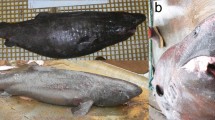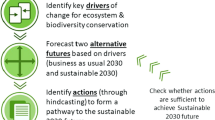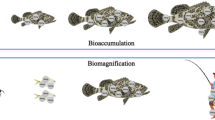Abstract
This paper is an attempt to synthesize and briefly examine the causes of the marine fisheries crisis, and to speculate about future initiatives. Ultimately, the human appetite is at the root of the marine fisheries crisis. But religion, technology, population pressure, science and our economic systems have provided vehicles for human appetite and thus contributed to overfishing. These various topics are further discussed in the context of the potential restoration of marine fisheries populations.
Similar content being viewed by others
References
Bakan, J. (2004). The corporation. Toronto: Viking Canada.
Barrett, J. H., Locker, A. M., & Roberts, C. M. (2004). The origins of intensive marine fishing in medieval Europe: The English evidence. Proceedings of the Royal Society of London B, 271, 2417–2421.
Bayes, J., & Tohidi, N. (2001). Globalization, gender, and religion: The politics of women’s rights in Catholic and Muslim contexts. New York: Palgrave MacMillan.
Bell, F. W. (1968). The Pope and the price of fish. The American Economic Review, 58(5), 1346–1350.
Berman, M. (1984). The reenchantment of the world. New York: Bantam Books.
Booth, S., & Zeller, D. (2005). Mercury, food webs, and marine mammals: Implications for human health. Environmental Health Perspectives, 113(5), 521–526.
Bryson, B. (2003). A short history of nearly everything. Toronto: Doubleday Canada.
Buttel, F. H. (1992). Environmentalization: Origins, processes, and implications for rural social change. Rural Sociology, 57(1), 1–27.
Carson, R. (1951). The sea around us. New York: Oxford University Press.
Chape, S., Harrison, J., Spalding, M., & Lysenko, I. (2005). Measuring the extent and protectedness of protected areas as an indicator for meeting global biodiversity indicators. The Philosophical Transactions of the Royal Society of Britain, 360, 443–455.
Clark, C. (1973). The economics of overexploitation. Science, 181, 630–634.
Clark, C., Munroe, G., & Sumaila, R. (2005). Subsidies, buybacks, and fisheries. Journal of Environmental Economics and Management, 50, 47–58.
Darwin, C. (1859). The origin of species. London: John Murray.
Dayton, P. K. (1998). Reversal of the burden of proof in fisheries management. Science, 279, 821–822.
Dunham, S., & Coward, H. (2000). World religions and ecosystem justice in the marine fishery. In H. Coward, R. Ommer, & T. Pitcher (Eds.), Just fish: Ethics and Canadian marine fisheries. Newfoundland: Institute of Social and Economic Research, Memorial University of Newfoundland.
Eckersley, R. (1988). Green politics—a practice in search of the theory. Alternatives, 15, 52–61.
Environmental Protection Agency (EPA) of the United States. (2004). National List of Fish Advisories for 2004 Press Release. Available online at http://map1.epa.gov/.
Fagan, B. (2006). Fish on friday. New York: Basic Books.
FAO. (2005). FAO FishStat database. Available online at www.fao.org/fi/statist/FISOFT/FISHPLUS.asp.
Harder, B. (2003). Sea burial for Canada’s cod fisheries. Science News, 163(20), 318.
Hardin, G. (1968). The tragedy of the commons. Science, 162, 1243–1248.
Holling, C. S. (2001). Understanding the complexity of economic, ecological, and social systems. Ecosystems, 4, 390–405.
Jackson, J., Kirby, M., Berger, W., Bjorndal, K., et al. (2001). Historical overfishing and the recent collapse of coastal ecosystems. Science, 293, 629–638.
Jacquet, J., & Pauly, D. (2007). The rise of seafood awareness campaigns in an era of collapsing fisheries. Marine Policy, 31, 308–313.
Johannes, R. E. (1978). Traditional marine conservation methods in Oceania and their demise. Annual Review of Ecology and Systematics, 9, 349–364.
Johannes, R. E., Freeman, M. M. R., & Hamilton, R. J. (2000). Ignore fishers’ knowledge and miss the boat. Fish and Fisheries, 1, 257–271.
Kearney, H. (1971). Science and change 1500–1700. Toronto: McGraw-Hill.
Kurlansky, M. (1997). Cod: A biography of the fish that changed the world. Toronto: A.A. Knopf.
Larkin, P. A. (1977). An epitaph for the concept of maximum sustained yield. Transactions of the American Fisheries Society, 106, 1–11.
Leopold, A. (1949). A Sand County Almanac and sketches here and there. New York: Oxford University Press.
Lewis, M. (1992). Green delusions—an environmentalist critique of radical environmentalism. Durham, North Carolina: Duke University Press.
Maggio, T. (2000). Mattanza: Love and death in the sea of Sicily. Cambridge, Massachusetts: Perseus Publishing.
McClenachan, L., Jackson, J., & Newman, M. (2006). Conservation implications of historic sea turtle nesting beach losses. Frontiers in Ecology and the Environment, 4(6), 290–296.
Meyers, N., & Kent, J. (2001). Perverse subsidies: How tax dollars can undercut the environment and the economy. Washington, D.C.: Island Press.
Moore, H. F. (1919). The sea as a conservator of wastes and a reservoir of food. Smithsonian Institution Annual Report, 72(1), 595–608.
Myers, R. A., & Worm, B. (2003). Rapid worldwide depletion of predatory fish communities. Nature, 423(6937), 280–283.
Naess, A. (1988). The basis of deep ecology. Resurgence, 126, 5–6.
Nash, R. (1982). Wilderness and the American mind. New Haven, Connecticut: Yale University Press.
National Marine Fisheries Service (NMFS). (2006). Fisheries of the U.S., 2005. Silver Springs, MD. 119 pp. Available online at: http://www.st.nmfs.gov/st1/fus/fus05/fus_2005.pdf.
Naylor, R., Goldburg, R., Primavera, J., Kautsky, N., Beveridge, M., Clay, J., Folke, C., Lubchenco, J., Mooney, H., & Troell, M. (2000). Effect of aquaculture on world fish supplies. Nature, 405, 1017–1024.
Pauly, D. (1994). On the sex of fish and the gender of scientists. London: Chapman and Hall.
Pauly, D. (1995). Anecdotes and the shifting baselines syndrome of fisheries. Trends in Ecology and Evolution, 10, 430.
Pauly, D. (1997). Small-scale fisheries in the tropics: Marginality, marginalization, some implications for fisheries management. In E. Pikitch, D. Huppert, & M. Sissenwine (Eds.), Global trends: Fisheries management. American Fisheries Society Symposium 20, Bethesda, Maryland.
Pauly, D. (2006). Major trends in small-scale marine fisheries, with emphasis on developing countries, and some implications for the social sciences. Maritime Studies, 4(2), 7–22.
Pauly, D. (2007). Journal club: A marine biologist dives into history of the gulf of California. Nature, 445, 343.
Pauly, D., Alder, J., Bennett, E., Christensen, V., Tyedmyers, P., Watson, R. (2003). The future for fisheries. Science, 302, 1359–1361.
Pauly, D., Christiensen, V., Dalsgaard, J., Freese, R., & Torres, F. (1998). Fishing down marine food webs. Science, 279, 860–863.
Pauly, D., Christensen, V., Guénette, S., Pitcher, T. J., Sumaila, U. R., Walters, C. J., Watson, R., & Zeller, D. (2002). Towards sustainability in world fisheries. Nature, 418, 689–695.
Pauly, D., & Maclean, J. (2003). In a perfect ocean. Washington, D.C.: Island Press.
Pitcher, T., & Hart, P. (1998). Conflict, consent and cooperation: An evolutionary perspective on individual human behaviour in fisheries management. In T. Pitcher, P. Hart, & D. Pauly (Eds.), Reinventing fisheries management (pp. 215–225). Dordrecht: Kluwer Academic Publishers.
Purcell, J., Graham, W., & Dumont, H. (2001). Jellyfish blooms: Ecological and societal importance. Dordrecht: Kluwer Academic Publishers.
Quinn, D. (1992). Ishmael. New York: Bantam/Turner Books.
Roman, J., & Palumbi, S. R. (2003). Whales before whaling in the North Atlantic. Science, 301, 508–510.
Roszak, T. (1973). Where the wasteland ends. New York: Doubleday Publishers.
Rousseau, J. (1754). A discourse on inequality. Republished by (London: Penguin) 1984; translated by Maurice Cranston.
Russ, G. R., & Zeller, D. (2003). From Mare Liberum to Mare Reservarum. Marine Policy, 27, 75–78.
Sahlins, M. (1972). Stone age economics. Chicago: Aldine-Atherton.
Schätzing, F. (2006). The swarm. New York: Harper Collins.
Schrope, M. (2006). The real sea change. Nature, 443, 622–624.
Schumacher, E. F. (1973). Small is beautiful: Economics as if people mattered. New York: Haper & Row.
Smith, T. (1994). Scaling fisheries: The science of measuring the effects of fishing. Cambridge: Cambridge University.
Sumaila, R. (2004). Intergenerational cost benefit analysis and marine ecosystems restoration. Fish and Fisheries, 5, 329–343.
Sumaila, R. & Pauly, D. (2006). Executive summary. In R. Sumaila, & D. Pauly (Eds.), Catching more bait: A bottom-up re-estimation of global fisheries subsidies. Fisheries Centre Research Reports 14(6), 2. Fisheries Centre, the University of British Columbia, Vancouver, Canada.
Sumaila, R., Marsden, D. Watson, R. & Pauly, D. (2007). Global ex-vessel fish price database: Construction, spatial, and temporal applications. Journal of Bioeconomics. doi: 10.1007/s10818-007-9015-4
Sumaila, R., & Walters, C. (2005). Intergenerational discounting: A new intuitive approach. Ecological Economics, 52, 135–142.
Volpe, J. (2005). Dollars without sense: The bait for big-money tuna ranching around the world. BioScience, 55, 301–302.
Walters, C. (1998). Management without accurate stock assessment. In T. Pitcher, P. Hart, & D. Pauly (Eds.), Reinventing fisheries management (pp. 279–288). Dordecht: Kluwer Academic Publishers.
Walters, C., & Maguire, J. (1996). Lessons for stock assessment from the northern cod collapse. Reviews in Fish Biology and Fisheries, 6, 125–137.
Watts, S. & Wu, V. (2005). At rock bottom: The declining sharks of the eastern tropical Pacific. A report produced for WildAid, San Francisco. Available online at: http://www.wildaid.org/PDF/reports/AtRockBottom.pdf.
White, L. Jr. (1967). The historical roots of our ecologic crisis. Science, 155, 1203–1207.
Williams, J. (2002). Ill Nature: Rant and reflections on humanity and other animals. London: Vintage Press.
Willughby, F. (1686). On the history of fish. London: The Royal Society.
Wilson, E. O. (2002). The future of life. New York: A.A. Knopf.
Wood, L. J. (2007). MPA global: A database of the world’s marine protected areas. Sea Around Us Project, UNEP-WCMC & WWF. http://www.mpaglobal.org.
World Health Organization (WHO). (2006). Global and regional food consumption patterns and trends: Availability and consumption of fish. http://www.who.int/nutrition/topics/3_foodconsumption/en/index5.html (Accessed on December 29, 2006).
Worm, B. (2006). Book review: Armageddon in the oceans. Science, 314, 1546.
Worm, B., Barbier, E. B., Beaumont, N., Duffy, N., Folke, C., Halpern, B. S., Jackson, J. B. C., Lotze, H. K., Micheli, F., Palumbi, S. R., Sala, E., Selkoe, K., Stachowicz, J. J., Watson, R. (2006). Impacts of biodiversity loss on ocean ecosystem services. Science, 314, 787–790.
Yellen, J. E., Brooks, A. S., Cornelissen, E., Mehlman, M. J., & Stewart, K. (1995). A middle stone age worked bone industry from Katanda, Upper Semlike Valley, Zaire. Science, 268, 553–536.
Zeller, D. (2005) From Mare Liberum to Mare Reservarum: Canada’s opportunity for global leadership in ocean resource governance. In A. Chircop, & M. L. McConnell (Eds.), Ocean yearbook (Vol. 19, pp. 1–18). Chicago: University of Chicago Press.
Acknowledgments
The author thanks J. Robinson, M. Bailey, C. Wilkinson, an anonymous reviewer, and, most of all, D. Pauly for suggestions on earlier drafts of this manuscript.
Author information
Authors and Affiliations
Corresponding author
Additional information
All titles with gratitude to The Talking Heads.
Readers should send their comments on this paper to: BhaskarNath@aol.com within 3 months of publication of this issue.
Rights and permissions
About this article
Cite this article
Jacquet, J. Silent water: a brief examination of the marine fisheries crisis. Environ Dev Sustain 11, 255–263 (2009). https://doi.org/10.1007/s10668-007-9108-1
Received:
Accepted:
Published:
Issue Date:
DOI: https://doi.org/10.1007/s10668-007-9108-1




